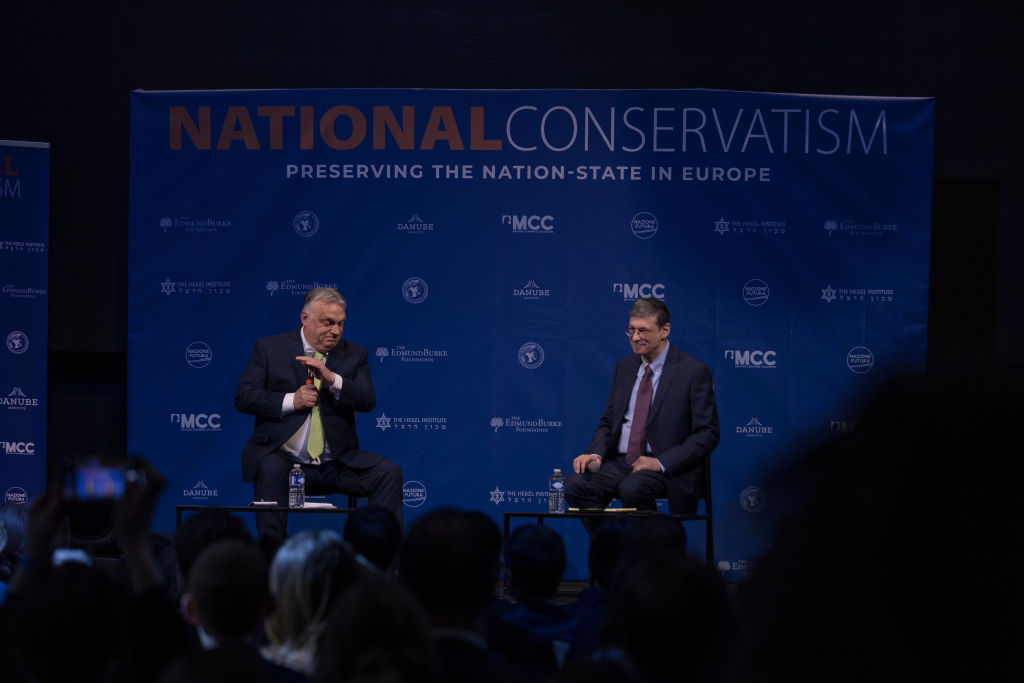Israel has killed Hamas leader Ismail Haniyeh and top Hezbollah commander Fuad Shukr. Haniyeh was killed in Tehran, where he was attending the inauguration of the new Iranian president; Shukr was killed in Beirut. The message from Jerusalem is clear enough: Commit atrocities against Israelis—and let us remember here that we are talking to a great extent about women and children, and almost exclusively about unarmed civilians—then there will be nowhere to hide. Let us hope that the gentlemen in Tehran take the appropriate lesson from this. The ladies and gentlemen in Washington, too.
The ladies and gentlemen in New York, on the other hand, appear beyond teaching.
“Netanyahu, Defiant, Appears to Have Gone Rogue, Risking a Regional War,” shrieks the New York Times. “Ignoring the efforts of President Biden and the condemnation of many allies, the Israeli prime minister is forcing the pace of the war and feeding the revolt of the far right.”
The headline above the essay by former Israel bureau chief Steven Erlanger is a model of how to use words to avoid talking about things. Benjamin Netanyahu is not at war—Israel is. And Israel is not “risking a regional war.” Israel is involved in a regional war, one that was forced upon it by Iran, sometimes using proxies and sometimes using its own forces directly, as it did on April 13, when it attacked Israel with more than 300 missiles and drones. The Houthis, Iran’s proxy in Yemen, are waging war on Israel—including a recent drone attack on Tel Aviv—as well as waging a war on the United States, attacking a U.S. Navy vessel in May, and conducting a wider military campaign against shipping in the Red Sea.
So, Israel is involved in a war. Iran is involved in the same war. Lebanon is involved in that war, too. So is Yemen. And—let’s go ahead and emphasize this for a second—so is the United States. Hamas killed Americans on October 7, too. And do you know who the late Fuad Shukr was? He was believed to be among those who organized the 1983 attack on U.S. Marines stationed in Beirut, killing 241 American servicemembers—the deadliest day for the Marines since Iwo Jima. (A simultaneous attack killed 58 French troops.) In 1983, the United States ignominiously turned tail and ran after the Beirut attack, with President Ronald Reagan grievously miscalculating that it wasn’t our fight. More Americans than you might think—including many on the right—had taken to heart George McGovern’s message in “Come Home, America.” (And the moronic caricature of Ronald Reagan that has largely displaced the complicated historical figure in the American mind makes it difficult to remember what a peacenik he was.) Americans had the option of coming home, and we took it. The Israelis are home. There is nowhere to go. And that is why the nation is mobilized—it is not Netanyahu’s war, though it has been politically beneficial to him.
One of the factors at work in the current Israel discourse in the United States—which includes explicitly pro-Hamas and jihadist elements on the American left—is old-fashioned antisemitism, the belief that the Jews simply cause trouble everywhere they are found by dint of their inconvenient habit of existing while being Jewish. There are more subtle versions of that, too, including the notion that Jews can be authentically Jewish only when they are victims, that they somehow transgress against the Jewish character when they defend themselves or look after their own interests. But there also is the matter of Americans’ insistence upon extending our own imbecilic partisan tribalism to circumvent the entire globe, attempting to understand the complex realities of world affairs through the distorting prism of American party politics.
Netanyahu is from the right, and so progressives understand him as being part of that more general thing called “the right,” whose most important constituent (for the purposes of American culture-war reckoning) is the American right—but that also includes the British right and anything to do with Brexit, the French right, the Italian right, the Hungarian right, etc. As recently as the overlapping executive careers of George W. Bush and Tony Blair or Barack Obama and Angela Merkel, it was possible (even normal!) for politicians representing very different political tendencies at home to work together internationally in the pursuit of common interests. But the left cannot abide Netanyahu or treat Israel as a genuine ally so long as Netanyahu is prime minister, and so the Biden administration finds itself unable to take its own side in a fight, at least unable to do so with full commitment. If the Harris campaign hopes to distinguish its candidate from her boss, it will find the going tricky.
Whether Israel has a government of the right or a government of the left should not matter very much to Americans. Israel is a decent, liberal, democratic state whose people can be trusted to choose their own governments and to manage their own affairs—and, more to the point, Israel has been a critical and necessary U.S. ally under Israeli governments of all characters and under U.S. governments of diverse kinds. That’s the thing about democratic regimes: Governments come and go, administrations come and go, but the country doesn’t stop being the country—as much as partisan hysterics insist otherwise.
Partisan blinders and language that obscures meaning make it difficult to see the plain facts. One of those facts is that Israel—and the United States—are already involved in a regional war in the Middle East. What do we mean to do about it? One option is to try to win the thing.
And, then, there’s the other option.
The Israelis give almost every indication that they mean to win. And for the Israelis, “win” is effectively a synonym for “survive.” The message from Washington is less clear. And there are two people in the United States who can be relied upon at all times to bring the opposite of clarity to any situation. One of them will be the next president.
Yoram Hazony Is Intellectually Dishonest

Every now and then, I feel the need to go on-the-record publicly about something. And this is one of those times.
Yoram Hazony is intellectually dishonest.
Allow me to elaborate.
Last month, I attended NatCon4, the annual conference of the so-called national conservatives, which is mainly a Donald Trump campaign rally but also a nexus for the right’s nationalists—who are a funny kind of nationalist after all, nationalists whose enemies are all in the United States and whose friends are all in Budapest. I wrote several pieces about the event, including one about the religion-and-nationalism panel, about which I could have written 10,000 words (and may yet; there’s that religion-and-politics book in the works) but contented myself with about 2,000. Hazony, one of the main forces behind the NatCon conference, wrote in to complain about the piece, arguing that I had given the panel insufficient attention and that my piece was “angry.”
(When I write that Yoram Hazony is intellectually dishonest, there are two possible explanations—one of which is that I am angry, the other of which is the self-evident truth.)
Eh, big deal. People write in to complain all the time. It’s what complainers do. But one of my colleagues got an idea: Why not take up the matter in a debate with Hazony? And that sounds to me about as much fun as getting a Prince Albert piercing, but, as Jonah Goldberg likes to say (quoting Lawrence of Arabia), “I am a river to my people.” I’ll go to Washington to talk to a doofus, or even a gaggle of doofi organized into a congressional subcommittee. I’ve done it before, and I’m sure I’ll do it again.
So one of my colleagues wrote Hazony proposing a conversation, and Hazony replied that he could not condescend to such a conversation because—and here is the lie in the service of cowardice—I had published scandalous antisemitic libels here in The Dispatch. “Kevin Williamson used your publication to say that my Judaism is pure idolatry,” he wrote. You’ll note the half-clever rhetorical gambit there: Hazony, faced with criticism of his politics, insists that what’s actually being criticized is Judaism.
I can understand why Hazony would want to avoid a discussion. (“Why does baloney avoid the grinder?” as William F. Buckley Jr. put it when describing his frustrated attempts to organize a debate with Robert Kennedy.) I can understand his deploying intellectual dishonesty in the service of intellectual cowardice—that is what dishonest men do.
Now that Hazony has so helpfully illustrated my point for me, allow me to reiterate here what I wrote in the original piece:
What morality asks of Donald Trump is one question, but the relevant one here is what Donald Trump demands of his adherents. The thou-shalt-not that should be top of mind here is not Trump’s adultery (or his idolatry, or his coveting, or his lying) but the Trump movement’s demand that its adherents bear false witness as a test of loyalty and condition for good standing.
That Trump recently was nicked by martyrdom makes it that much easier to sanctify the lies and the fraud and the adultery and the cruelty and the bulls—t.
Is there a single honest Trump apologist in America? I cannot think of one. There certainly weren’t any to be seen at the RNC. All of them bear false witness: about the 2020 election, about the origin of Trump’s legal troubles, about his business and political record, about his character, about his religious convictions, about Joe Biden, about the Democrats, about the state of the country, about Ukraine, about Russia. Trump is dishonest himself and a spur to dishonesty in others. Read Steve Hayes’ recent conversation with born-again bulls—t artist Mike Lee to get a taste of it.
Yoram Hazony can stand up there and declare that you cannot call yourself a conservative if you have any hesitation about public displays of the Ten Commandments. But can you call yourself a Christian—or, in Hazony’s case, an observant religious Jew—if you stand in front of those commandments and systematically violate them in the cause of political expedience?
The notion that I would argue that Judaism is idolatry is preposterous. The notion that The Dispatch would publish such a claim is preposterous. Yoram Hazony’s politics are febrile and idolatrous. About his personal religious conviction, I know nothing other than the fact that it is insufficient to keep him from being dishonest and ridiculous. About Judaism per se, I have often observed that what my fellow Catholics should learn from Protestants is love of Scripture and its study, and what we should learn from Jews—our “elder brothers in faith,” as Pope John Paul II called them—is abhorrence of idolatry. Perhaps by “my Judaism,” Hazony means something other than what the rest of the world calls Judaism, like when a callow kid with a head full of intersectionality talks about “my truth.” But if what we are talking about is Judaism, then I believe my record on the subject speaks for itself.
“Let the lie come into the world, let it even triumph. But not through me.”
Words About Words
Corn. It is a more subtle thing than you might think.
Last week, I quoted from James George Frazer’s The Golden Bough:
If the festival of the first of August was in its origin an offering of the first-fruits of the corn-harvest, we can easily understand the great importance which the ancient Irish attached to it, and why they should have thought that its observance ensured a plentiful crop of corn as well as abundance of fruit and milk and fish, whereas the neglect of the festival would entail the failure of these things and cause the hair of their kings to turn prematurely grey.
What gives? some readers demanded. Isn’t corn a New World thing? How would the ancient Irish have even known about it, much less grown it?
In American English, corn refers to that yellow stuff they grow a lot of in Iowa, the stuff those ethanol bastards make their money turning into ersatz gasoline and forcing the rest of us to use. In British English, corn encompasses grains and cereal crops categorically. Don’t tell the USDA, but, for a great many English-speaking people, wheat is corn.
What we call corn, many other English speakers call Indian corn or maize. The English-speaking people who first encountered maize in North America applied to it the word that seemed to them closest.
So the Anti-Corn Law League, to take one example, wasn’t concerned with restrictions on the trade and cultivation of what we call corn. They were talking mostly about what we call wheat. The Anti-Corn Law League is one of my favorite old political organizations; they had a great newsletter, which we today know as The Economist. They also had the better side of the argument way back when, and still do.
Economics for English Majors
Why did the Anti-Corn Law League have the better argument, you ask? The same reason free-traders do today: Trade restrictions are a scam. If trading with nefarious Canadians really were contrary to the economic interests of ordinary Americans, we wouldn’t need a law against it: Americans do not need to be coerced into looking after their own affairs. But trade restrictions are never in the interests of consumers—they are, at best, in the interest of politically connected and influential businesses that wish to be rid of competition, leaving consumers with no choice but to buy certain goods when, left to mind their own affairs, they would have preferred others.
The Corn Laws were a particularly dramatic example of how the politics of trade restriction actually work. There was a lot of nationalistic huffing and puffing, talk of patriotism, and warning that the British could not safely rely on scheming foreigners (especially the French!) for critical goods. Free trade in corn, they argued, was a national security threat as well as a force that would destabilize farming communities and traditional ways of life.
Wait—who argued that?
The wealthy landowners who controlled the domestic corn business, of course. The poor weren’t worried about the French, they were worried about what the poor are always worried about: the price of bread. Restrictions on trade are restrictions on supply, and where supply is restricted, there will be upward pressure on prices. The landowning aristocracy demanded to be protected from the scourge of low bread prices for the poor. And that argument was successful for a very long time.
We’ve had it here, too. For much of the post-war era, unionized autoworkers were paid outsized wages to produce terrible cars, the profits of which inflated the incomes of much more highly paid executives and relatively wealthy shareholders. When the Japanese entered the market with a radical plan—build cars that don’t break down all the time!—the U.S. automotive business demanded protection. And it often got it, even from erstwhile free traders such as Ronald Reagan. But short of mining the harbors, no protectionist measure was going to keep Americans from buying Toyotas and Hondas and what used to be called Datsuns. We were treated to lectures by ill-educated oafs such as Donald Trump that Americans could not compete with that fixture of American economic discourse, the Asian Economic Superman.
In the 1960s, Japan was a relatively poor and low-wage country, and so, of course, its firms could produce superior automobiles at lower prices. Today, Japan is a rich and high-wage country, and so, of course, its firms can produce superior automobiles at lower prices. The populists back then talked about the Japanese the way they talk about the Chinese today. You know: They don’t really value individual life the way we do, they are used to working like slaves, they can subsist on low wages. The Japanese autoworker “didn’t get much USO. He was dug in too deep or moving too fast. His idea of great R&R was cold rice and a little rat meat. He had only two ways home: death, or hitting his monthly production quota.” (All right, that last bit is from Apocalypse Now, a film about Vietnam adapted from a novella about the Congo Free State, but that’s how they talk, and you know it.) A few years ago, the South Koreans were too poor and undeveloped to compete with; today, the South Koreans are too rich and sophisticated to compete with.
There are whisperings of an Indian Economic Superman to take up the torch that has passed from the Japanese to the Chinese to the Koreans. I guess everybody east of the Urals will get a turn.
Elsewhere …
Here’s a weird mix: Andrew Rannells, Junot Diaz, and me. Writing in the Wall Street Journal, I consider the perplexing case of my mother, who almost lost an arm to a poodle scratch but fed bears out of the palm of her hand. The theme is, “What I Learned on My Summer Vacation.”
You can buy my most recent book, Big White Ghetto, here.
You can buy my other books here.
You can see my New York Post columns here.
Please subscribe to The Dispatch if you haven’t.
You can check out “How the World Works,” a series of interviews on work I’m doing for the Competitive Enterprise Institute, here.
In Conclusion …
That’s a bandana, no?











Please note that we at The Dispatch hold ourselves, our work, and our commenters to a higher standard than other places on the internet. We welcome comments that foster genuine debate or discussion—including comments critical of us or our work—but responses that include ad hominem attacks on fellow Dispatch members or are intended to stoke fear and anger may be moderated.
With your membership, you only have the ability to comment on The Morning Dispatch articles. Consider upgrading to join the conversation everywhere.